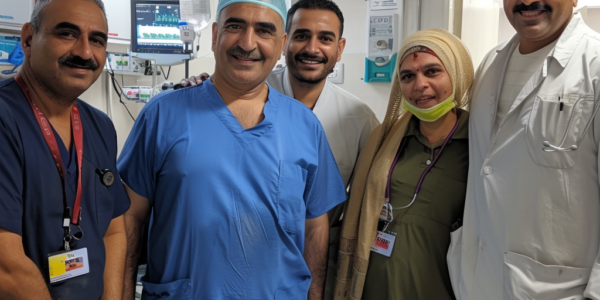Study Finds Teens and Young Adults with Mood Disorders Less Likely to Obtain Driver’s License and Face Elevated Crash Risk
Researchers from Children’s Hospital of Philadelphia (CHOP) have discovered that individuals with mood disorders are 30% less likely to obtain their driver’s license and face an elevated risk of crashes. The study emphasizes the need for guidance and training to help these individuals overcome barriers and mitigate crash risks. With as many as one in 10 teens and young adults being diagnosed with mood disorders, the findings hold significant relevance and highlight the need for evidence-based guidance for families regarding driving readiness and instruction.
Iraqi Man Overcomes Stage 4 Rectal Cancer with Complex Surgery in India
Iraqi man, 47, overcomes stage 4 rectal cancer after complex surgery in India. Misdiagnosed with piles, patient undergoes chemotherapy, radiation, and CRS and HIPEC procedures at Manipal Hospital. Despite initial poor prognosis, patient returns home with better quality of life, highlighting the effectiveness of advanced medical interventions in treating cancer.
Educational Video Increases Prostate Cancer Screening Intentions in Philadelphia Men
Learn about the culturally sensitive educational video presented by the Abramson Cancer Center at Penn Medicine, aimed at addressing prostate cancer screening disparities and well-received by over 600 men in the Philadelphia region. Dr. Carmen Guerra emphasized the importance of dispelling myths and misconceptions surrounding cancer screenings, particularly for Black men who are disproportionately affected by prostate cancer.
Study Identifies Potential Marker for Delayed Recovery of Concussion in Children
A recent study has identified a potential marker for delayed recovery of concussion in children, offering hope for improved diagnosis and treatment. The blood protein alpha-1-antichymotrypsin (alpha-1-ACT) was found to be significantly lower in children with delayed recovery, providing a potential tool for early identification of at-risk children. The study’s publication in the Journal of Neurotrauma underscores the significance of these findings and their potential impact on pediatric concussion management.
Study Shows Electronic Health Record-Based Algorithm Does Not Reduce Hospitalization in Patients with Kidney Dysfunction Triad
A recent study published in the New England Journal of Medicine found that an electronic health record-based algorithm and intervention did not lead to reduced hospitalization in patients with chronic kidney disease, type 2 diabetes, and hypertension. The study involved over 11,000 patients and showed that the intervention did not result in better disease control or reduced hospitalization compared to usual care. This research provides valuable insights into the effectiveness of electronic health record-based algorithms and interventions for managing the kidney dysfunction triad.
Baylor College of Medicine Researchers Win 2024 STAT Madness with Innovative Sewage Surveillance Study
Baylor College of Medicine researchers win 2024 STAT Madness with innovative sewage-based early-warning system for viral disease outbreaks. Their study detected over 450 viruses in public wastewater, expanding the scope of wastewater monitoring to predict and assess infection trends. Their pioneering work demonstrates the potential of sewage surveillance as a powerful tool for early detection of viral diseases.
Phenomix Sciences Launches MyPhenome Test to Identify Three Distinct Obesity Phenotypes
Phenomix Sciences has introduced a groundbreaking MyPhenomeTM test to identify and analyze three distinct obesity phenotypes in a single, convenient test. This innovative test offers individuals deeper insights into the underlying causes of their obesity, paving the way for tailored, effective interventions.
Man Discharged After Receiving Genetically Modified Pig Kidney Transplant
The first man to receive a genetically modified pig kidney transplant has been discharged from Massachusetts General Hospital after a successful surgery. The historic procedure is being celebrated as a significant milestone in the field of transplantation, offering hope to thousands of people in need of transplants. The pig kidney, modified by eGenesis, was approved for use under a compassionate use protocol, potentially addressing the world’s organ shortage.
Promising Results in Slowing Parkinson’s Disease Progression
French researchers conduct a one-year study using a GLP-1 receptor agonist, a drug similar to Ozempic, showing promising results in slowing the progression of Parkinson’s disease. This development brings hope to the half a million Americans diagnosed with the illness and offers a glimmer of hope for individuals affected by Parkinson’s disease.
Groundbreaking Study Shows Early High-Efficacy Therapies Improve Outcomes for Pediatric MS
Groundbreaking global study reveals that early and aggressive treatment with high-efficacy therapies can significantly improve outcomes for children with multiple sclerosis (MS). Research emphasizes the importance of administering high-efficacy disease-modifying therapies to pediatric MS patients early in their diagnosis to prevent the onset of significant disability. Study analyzed data from over 5,000 individuals diagnosed with MS during childhood over the past 30 years, drawing from international registries and national databases. Findings offer hope for improved treatment strategies for pediatric MS, potentially reshaping the approach to managing the condition in young patients.










